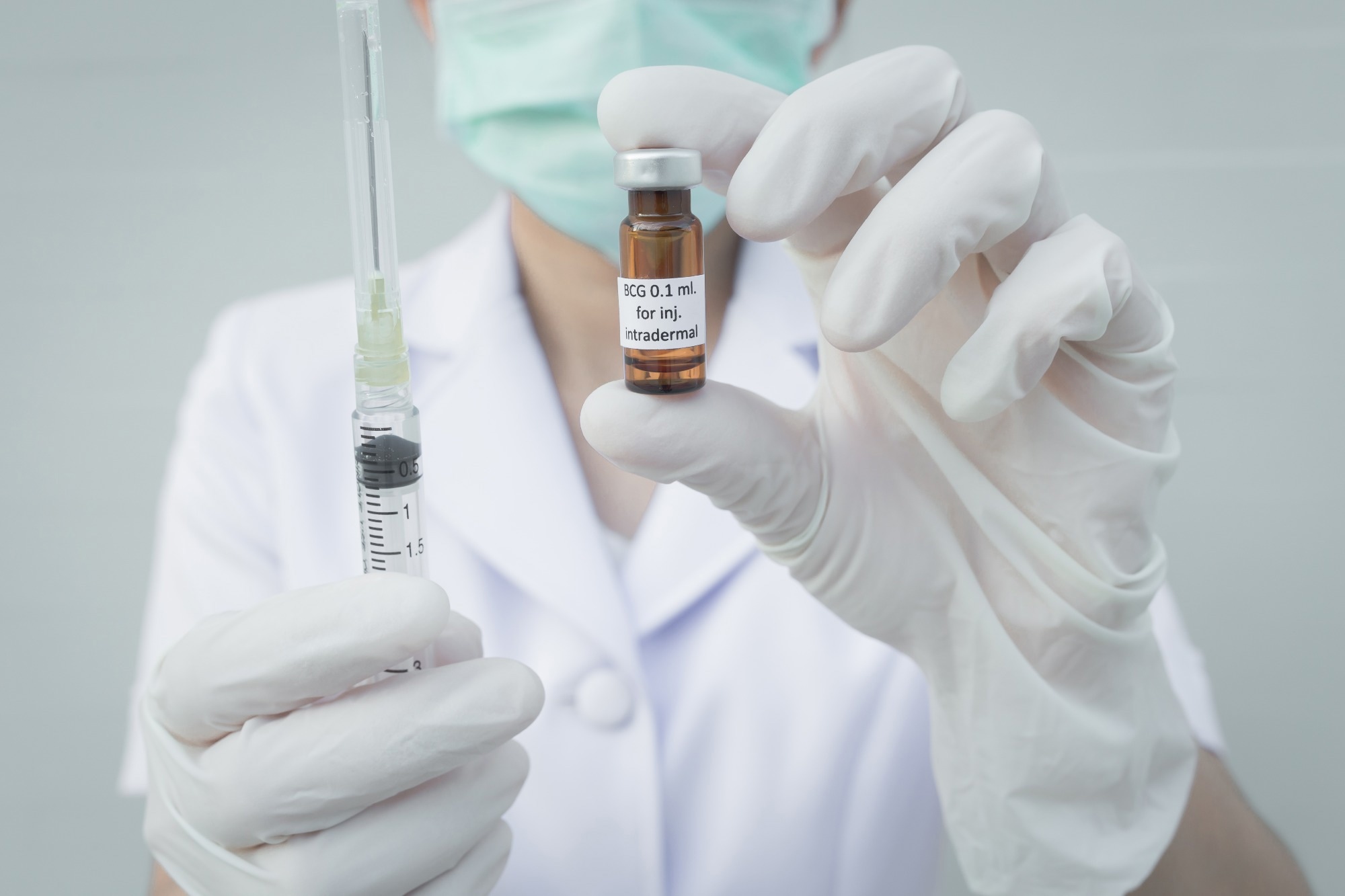A recent study published in The New England Journal of Medicine evaluated whether the bacilli Calmette–Guérin (BCG) vaccine could protect healthcare workers (HCWs) against coronavirus disease 2019 (COVID-19).
 Study: Randomized Trial of BCG Vaccine to Protect against Covid-19 in Health Care Workers. Image Credit: ChompooSuriyo/Shutterstock.com
Study: Randomized Trial of BCG Vaccine to Protect against Covid-19 in Health Care Workers. Image Credit: ChompooSuriyo/Shutterstock.com
Background
The BCG vaccine has off-target immunomodulatory effects, which might additionally protect against other infections. The vaccine is associated with a lower mortality risk from any cause in infants and a lower risk of respiratory infections in adults/adolescents.
In the early COVID-19 pandemic, BCG vaccine repurposing was proposed to protect against COVID-19. The hypothesis was that the vaccine might augment protection against SARS-CoV-2 until vaccines for the pathogen were available.
About the study
In the present study, researchers evaluated whether COVID-19 incidence and severity would be lower in BCG-vaccinated HCWs in a randomized controlled trial. The study was conducted in two phases.
In the first phase, only Australian HCWs were recruited between March and May 2020. In the second phase, HCWs were recruited from Brazil, Spain, the Netherlands, and the United Kingdom between May 2020 and April 2021.
Subjects were excluded if previously they were SARS-CoV-2-positive, immunized with the BCG vaccine in the past year or other live-attenuated vaccines in the past month, involved in other COVID-19 trials, or had contraindications to the BCG vaccine.
Participants in the double-blind second phase were randomized to receive the BCG vaccine or a saline placebo and were followed for one year.
The current analysis focused on the second phase because community transmission of SARS-CoV-2 was negligible in the first phase. Blood samples were collected at baseline and every three months after randomization for serologic testing.
Respiratory swab samples were also obtained from Brazilian HCWs for the SARS-CoV-2 reverse-transcription polymerase chain reaction (RT-PCR) assay.
Randomization was stratified by age group, geographic region, and the presence/absence of coexisting conditions.
A dose of 0.1 ml BCG-Denmark vaccine or placebo was intradermally injected. Primary outcomes were the incidence of symptomatic COVID-19 and severe illness at six months post-randomization.
Severe illness is a COVID-19 episode with severe disease without hospitalization or death. Secondary outcomes were asymptomatic infection, time to COVID-19 onset, number of days with symptoms, number of days confined to bed or absent from work, number of COVID-19 episodes, and complications.
Findings
In the second phase, 3,988 HCWs were randomized to receive the BCG vaccine or placebo. Baseline characteristics were similar between vaccine and placebo recipients, except for the marginally higher proportion of females among placebo recipients.
Most participants (64%) were recruited in Brazil. At baseline, 14% of participants were positive for SARS-CoV-2 antibodies, and 2.7% of swabs from Brazilian participants were positive for SARS-CoV-2.
As such, the modified intention-to-treat population included 1,703 subjects in the BCG group and 1,683 in the placebo group. Symptomatic COVID-19 was recorded in 132 BCG recipients and 106 placebo recipients. Severe COVID-19 occurred in 75 and 61 subjects in BCG and placebo groups, respectively.
Most patients with severe illness could not work for at least three days. The probability of any episode of COVID-19 was higher among BCG recipients than placebo participants. Five hospitalizations occurred in each group. BCG recipients aged 60 or older had fewer days with symptoms than those in the placebo group.
In a subgroup of HCWs without coexisting conditions, BCG recipients had fewer days with symptoms than placebo recipients. In a subset of those with coexisting conditions, placebo recipients had fewer symptomatic days than BCG recipients.
Twenty BCG participants and nine placebo recipients reported 30 adverse events overall. Investigators deemed all serious adverse events as unrelated to the intervention.
Conclusions
The researchers found that the BCG vaccine did not reduce COVID-19 risk within six months post-vaccination compared to the placebo. Notably, the COVID-19 episode(s) risk was higher in BCG recipients than in placebo subjects.
More than a third of the participants were previously vaccinated with the BCG, and it has been suggested that off-target effects might be higher in previously vaccinated subjects.
Further, it is possible that (BCG) revaccination may not increment off-target benefits beyond those provided by the previous vaccination.
Interestingly, there was weak evidence of increased severe COVID-19 incidence in the BCG group among those who were not previously vaccinated but not in those revaccinated with BCG. In sum, BCG vaccination did not decrease COVID-19 risk in HCWs, and the possibility of increased risk could not be excluded.
-
Pittet LF, Messina NL, Orsini F, et al. (2023) Randomized Trial of BCG Vaccine to Protect against Covid-19 in Health Care Workers. N Engl J Med., doi: 10.1056/NEJMoa2212616 https://www.nejm.org/doi/full/10.1056/NEJMoa2212616?query=featured_coronavirus
Posted in: Medical Science News | Medical Research News | Disease/Infection News | Healthcare News
Tags: Adolescents, Antibodies, Assay, BCG Vaccine, Blood, Coronavirus, Coronavirus Disease COVID-19, covid-19, Healthcare, Immunomodulatory, Medicine, Mortality, Pandemic, Pathogen, Placebo, Polymerase, Polymerase Chain Reaction, Respiratory, SARS, SARS-CoV-2, Transcription, Vaccine

Written by
Tarun Sai Lomte
Tarun is a writer based in Hyderabad, India. He has a Master’s degree in Biotechnology from the University of Hyderabad and is enthusiastic about scientific research. He enjoys reading research papers and literature reviews and is passionate about writing.
Source: Read Full Article